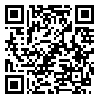BibTeX | RIS | EndNote | Medlars | ProCite | Reference Manager | RefWorks
Send citation to:
URL: http://ijme.tums.ac.ir/article-1-89-en.html
2- Epidemiology and Reproductive Health Department, Reproductive Health Research Center, Royan Institute, Tehran, Iran
3- Medical Ethics and History ofMedicine Research Center, Tehran University ofMedical Sciences, Tehran, Iran.
Recently larger numbers of women of advanced age are referring to fertility centers. Although there may be no age restriction for women who are naturally able to and want to be pregnant, using assisted reproductive techniques for women of advanced age is medically and ethically disputed, and this question is always raised: "Should there be an age limit for accessing assisted reproductive techniques for women?" This study was a review of ethical, legal and religious issues regarding pregnancy and reproduction in advanced age for women. We tried to cover codes, legislations and articles on the subject. There is no national legislation about age limit for women seeking assisted reproduction. In this regard, fertility clinics follow their own protocols. Most centers do not accept women older than 45 unless there is a specific clinical situation confirmed by a physician. In any case, the safety of the mother and her child must be the first concern of the physician, and all the treatment protocols should be determined accordingly. Obviously, age alone cannot be a suitable criterion for rejecting the infertile patient. Therefore, regardless of the patient's persistence and their ability to afford treatment, physicians should consider mother's safety and the welfare of the child before admission. Pursuing an all-inclusive legislation and guideline seems to be of great importance in Iran.
Accepted: 2013/10/14 | Published: 2017/09/27
| Rights and permissions | |
 |
This work is licensed under a Creative Commons Attribution-NonCommercial 4.0 International License. |





